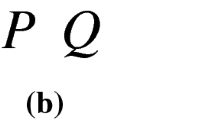Abstract
The system of Peirce’s existential graphs is a diagrammatic version of first order logic. To be more precise: As Peirce wanted to develop a logic of relatives (i.e., relations), existential graphs correspond to first order logic with relations and identity, but without constants or functions. In contemporary elaborations of first order logic, constants and functions are usually employed. In this paper, it is described how the syntax, semantics and calculus for Peirce’s existential graphs has to be extended in order to encompass constants and functions as well.
Preview
Unable to display preview. Download preview PDF.
Similar content being viewed by others
References
Burch, R.W.: A Peircean Reduction Thesis: The Foundation of Topological Logic. Texas Tech. University Press, Texas, Lubbock (1991)
Chein, M., Mugnier, M.-L.: Conceptual graphs: Fundamental notions. Revue d’Intelligence Artificiell 6, 365–406 (1992)
Chein, M., Mugnier, M.-L.: Conceptual graphs are also graphs. Technical report, LIRMM, Université Montpellier II, Rapport de Recherche 95003 (1995)
Dau, F.: An embedding of existential graphs into concept graphs with negations. In: Priss, U., Corbett, D.R., Angelova, G. (eds.) ICCS 2002. LNCS (LNAI), vol. 2393, pp. 15–19. Springer, Heidelberg (2002)
Dau, F.: The Logic System of Concept Graphs with Negations and its Relationship to Predicate Logic. In: Dau, F. (ed.) The Logic System of Concept Graphs with Negation. LNCS (LNAI), vol. 2892, Springer, Heidelberg (2003)
Dau, F.: Fixing shin’s reading algorithm for peirce’s existential graphs. In: Barker-Plummer, D., Cox, R., Swoboda, N. (eds.) Diagrams 2006. LNCS (LNAI), vol. 4045, pp. 88–92. Springer, Heidelberg (2006)
Dau, F.: Mathematical logic with diagrams, based on the existential graphs of peirce. Habilitation thesis (to be published), Available at: http://www.dr-dau.net
Dau, F.: The role of existential graphs in peirce’s philosophy. In: Schärfe, H., Hitzler, P., Øhrstrøm, P. (eds.) ICCS 2006. LNCS (LNAI), vol. 4068, pp. 28–41. Springer, Heidelberg (2006)
Dau, F.: Some notes on proofs with alpha graphs. In: Schärfe, H., Hitzler, P., Øhrstrøm, P. (eds.) ICCS 2006. LNCS (LNAI), vol. 4068, pp. 172–188. Springer, Heidelberg (2006)
Dau, F., Eklund, P.: Towards a diagrammatic reasoning system for description logics. Submitted to the Journal of Visual Languages and Computing, Elsevier (2006), Available at http://www.kvocentral.org
Hartshorne, W., Burks (eds.): Collected Papers of Charles Sanders Peirce, Harvard University Press, Cambridge, Massachusetts (1931-1935)
Peirce, C.S., Sowa, J.F.: Existential Graphs: MS 514 by Charles Sanders Peirce with commentary by John Sowa, 1908 (2000), Available at: http://www.jfsowa.com/peirce/ms514.htm
Roberts, D.D.: The Existential Graphs of Charles S. Peirce. Mouton, The Hague, Paris (1973)
Shin, S.-J.: The Iconic Logic of Peirce’s Graphs. Bradford Book, Massachusetts (2002)
Sowa, J.F.: Conceptual structures: information processing in mind and machine. Addison-Wesley, Reading, Mass (1984)
Sowa, J.F.: Conceptual graphs summary. In: Nagle, T.E., Nagle, J.A., Gerholz, L.L., Eklund, P.W. (eds.) Conceptual Structures: current research and practice, pp. 3–51. Ellis Horwood (1992)
Sowa, J.F.: Knowledge Representation: Logical, Philosophical, and Computational Foundations, Brooks Cole, Pacific Grove, CA (2000)
Zeman, J.J.: The Graphical Logic of C. S. Peirce. PhD thesis, University of Chicago (1964), Available at: http://www.clas.ufl.edu/users/jzeman/
Author information
Authors and Affiliations
Editor information
Rights and permissions
Copyright information
© 2007 Springer-Verlag Berlin Heidelberg
About this paper
Cite this paper
Dau, F. (2007). Constants and Functions in Peirce’s Existential Graphs. In: Priss, U., Polovina, S., Hill, R. (eds) Conceptual Structures: Knowledge Architectures for Smart Applications. ICCS 2007. Lecture Notes in Computer Science(), vol 4604. Springer, Berlin, Heidelberg. https://doi.org/10.1007/978-3-540-73681-3_32
Download citation
DOI: https://doi.org/10.1007/978-3-540-73681-3_32
Publisher Name: Springer, Berlin, Heidelberg
Print ISBN: 978-3-540-73680-6
Online ISBN: 978-3-540-73681-3
eBook Packages: Computer ScienceComputer Science (R0)




